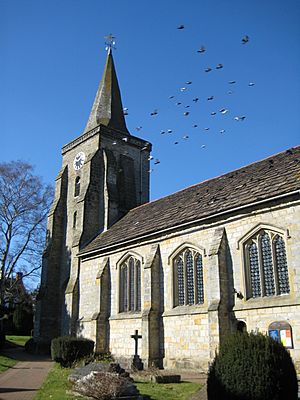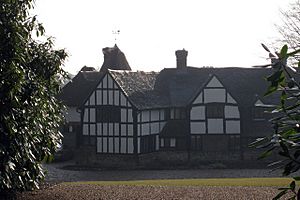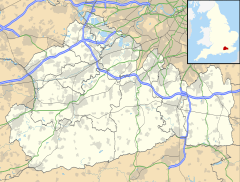Lingfield facts for kids
Quick facts for kids Lingfield |
|
|---|---|
 Grade I listed Church of SS Peter and Paul |
|
 Example of Tudor period architecture in Lingfield |
|
| Area | 8.76 km2 (3.38 sq mi) |
| Population | 4,467 (Civil Parish) |
| • Density | 510/km2 (1,300/sq mi) |
| OS grid reference | TQ395385 |
| • London | 23.4 miles (37.7 km) |
| Civil parish |
|
| District |
|
| Shire county | |
| Region | |
| Country | England |
| Sovereign state | United Kingdom |
| Post town | LINGFIELD |
| Postcode district | RH7 |
| Dialling code | 01342 |
| Police | Surrey |
| Fire | Surrey |
| Ambulance | South East Coast |
| EU Parliament | South East England |
| UK Parliament |
|
Lingfield is a lovely village located in Surrey, England. It is also known as a civil parish, which is a local area with its own council. In 2001, about 4,215 people lived here. Lingfield is a great place to learn about English history and village life.
Contents
Discovering Lingfield
Lingfield is found in the county of Surrey, which is in the South East of England. It's about 23.4 miles (or 37.7 kilometers) away from London. This makes it a quiet place but still close enough to a big city.
What is a Civil Parish?
A civil parish is like a small local government area. It has a council that helps manage things for the people living there. Lingfield has its own civil parish, which means local people have a say in how their village is run.
Lingfield's Population and Size
According to information from 2001, Lingfield was home to 4,215 people. More recently, the civil parish population was recorded as 4,467. The village covers an area of about 8.76 square kilometers. This makes it a medium-sized village with enough space for everyone.
Important Buildings in Lingfield
Lingfield has some interesting old buildings. One of them is the Church of SS Peter and Paul. This church is very old and important, so it's listed as a Grade I building. This means it has special historical or architectural value.
You can also see examples of Tudor architecture in Lingfield. Tudor architecture refers to buildings made during the time of the Tudor kings and queens in England, from the late 1400s to the early 1600s. These buildings often have a unique look with timber frames and brickwork.
Images for kids
 | William M. Jackson |
 | Juan E. Gilbert |
 | Neil deGrasse Tyson |




